Items
Subject is exactly
Online Learning
-
2020-03-24
From The Traditional to the Unknown: Moving from In-Person to Online Learning
Much like other college students in the spring of 2020, I did not know how to react to the news that a virus called COVID-19 had begun infecting major cities, towns, and people. As an avid gamer, it appeared to me as though we started heading down the path of a zombie apocalypse or something similar to that, such as the ones you see in Call of Duty. I can still remember where I was as a sophomore in college when my school decided that it needed to shut down, sending students back to their homes and moving classes to the online world. At the start of what became pandemonium, I was with my friends in one of their dorm rooms, and we watched as the former president of the school, with a panel of other officials, answered questions about the pandemic and how the institution would respond. From my perspective, it seemed that no one knew what to do, and it was disconcerting to see that the leaders of the school were themselves in a state of flux. But who could blame them? In many ways, that spring of 2020 was unchartered waters, where everyone, including our leaders, did not know what to do or how to set forth a concrete plan. The lack of certainty, as I recall, led many students to become unsure of how the school would handle classes, graduation, plans for reimbursement for housing and dining costs, and, most importantly, the health and safety of the students and faculty. From that moment in spring 2020, it seemed that the college landscape would never be the same. With that said, this leads me to the point of my story. When the school decided that all classes would go online for the remainder of the spring 2020 semester and the entirety of the following school year, 2020 - 2021, it seemed entirely new and, in some ways, scary. Never before had I taken online classes, let alone know how to operate a program called Zoom. When I read the newsletter from my school saying that the 2020-2021 academic year would be online, it seemed, from my view, almost pointless to make students do schoolwork at a time when everyone was more concerned about their health and not getting other people sick. From that perspective, I felt angry, confused, and dismayed about how online classes would work. More importantly, I wanted to know how professors would respond to the situation, hopefully having them recognize that they should not assign a traditional amount of school work for a semester course given the extenuating circumstances beyond the classroom and college. I can still recall taking my first online class, and I felt utterly lost. I did not know how to operate Zoom, I did not know how to interact with my professors and classmates by staring into a camera on my computer, and I did not know, at the start, how challenging it would be to feel motivated to do the schoolwork. The latter was a difficult obstacle to overcome as being back at home and not in a classroom made it easier to forgo doing school work for a day, creating a lackadaisical mindset that negated my ability to do my assignments in a timely manner. On top of that, not being able to physically see my professors, either in class or in their office, made it even more difficult to ask questions. As someone who typically raises an abundance of questions, it seemed to me that that was no longer possible. Having to send several emails back and forth and then only have a few minutes to speak with a professor on Zoom after or before class made the process more cumbersome. The transition from the traditional classroom setting to the unknown world of online learning was a significant curve ball created by the pandemic that made the last part of my sophomore year and my entire junior year feel less important. The online medium essentially made the coursework seem less valuable to me. Even though I lived on campus in my junior year, 2021 - 2022, at the height of the pandemic, the educational side of my college experience became impacted to such a degree that I found myself not as engaged about the work or the course material. To that end, I share this story because it is one of many about how the pandemic took a substantial bite out of educational processes from 2020 into 2021. The classroom never felt the same during the pandemic and when I was on campus in 2021. Everywhere was a ghost town. In many ways, having to go from the traditional classroom into the expansive world of online learning was not something I thought I needed to think about as a college student. Of course, no one could have predicted what was going to happen, making the situation during that time all the more difficult to accept. I look back on it now and realize that I did lose a year and a half of my college experience. It is an unfortunate outcome of the pandemic, but I am thankful that no one in my family passed away from the disease, and all of my friends were safe as well. I wish I could relive my sophomore and junior years as a regular college student. However, having gone to college in the midst of the pandemic is historic, and I want to tell other generations about this experience. It will be challenging for future students to know what it was like to go to school at the same time a rampant disease spread across the globe. On the flip side, I think going to college during this time shows resiliency and courage on the part of many people. I hope this story is one that many can relate to as we move forward from these troubling years and continue to grapple with the legacy caused by the pandemic. -
 2024-05-10
2024-05-10Two weeks turns into months
Hearing of this so-called COVID-19 virus towards the beginning of my junior year of High School sounded a little suspicious. It was as if I was watching a movie about an apocalypse. Where everyone rushes to the supermarkets and grabs everything they can. Disinfecting every item as we bring it back into our house. Making sure we wear masks. The news of hearing that two weeks off of school to any student sounds amazing. Although I didn't expect it to turn into months. Not being able to see any of my friends or teachers. Learning everything online has changed the way schools teach to this day. It went from "Yes two weeks off" to "Where did time go?". As time passed going back into school was an adjustment as well. Only kids with the same starting last names had to go to school one day while the other half had to another day. Still, wearing masks doing COVID check-ups before entering the school as well as even checking our temperature as we walk in. Overall looking back I've noticed how hard Covid hit globally. People had to isolate for long periods of time, making sure family members and friends were okay. It was overall a tough time, but we can take a lot from this pandemic to use in future uses. -
2020-03-31
Covid: My Experience in the Pandemic
Covid: My Experience in the Pandemic The pandemic was an unforgettable experience for my family, as well as countless others. During a time of struggle, we faced many unforeseen challenges that were somewhat difficult for our developing minds to comprehend. Not to mention, the greater the understanding, the greater our issue seemed to be. However, in a time of dread, it became a blessing eventually. In the beginning, it was more of an adjusting period. The idea of quarantine rocked our worlds as we could no longer be out and about. Attempting to find creative solutions seemed challenging, which led us to free meals from different businesses attempting to be of service. Not to mention, on Sundays, we were unable to go to church. However, this soon became a blessing as we began doing “church at home”, which quickly led to a strong family bond. Around the middle of covid, things became slightly easier. We were beginning to adapt to the challenges presented to us. We began working with our neighbors’ family to complete online school, which formed an unbreakable bond with them as well. The grandmother of the house made everything go smoothly, and she supported us over the years. Moreover, in previous years, she would work with my siblings and I to ensure our success in academics. Finally, the end of covid felt like the worst. The transition back to school was not without its tribulations. Others like me had lost their sense of self, acting irrationally. In the midst of it all, the grandmother of our neighbor's family caught covid. Unfortunately, she didn't make it. It took a long time, but we came to terms with it and we were truly blessed to have met her and blessed because she was a chapter in our lives. In conclusion, my family as well as my neighbors’ felt the challenges of covid. However, instead of separating us, covid (ironically) brought us closer together than ever before. From bad to blessed, from terrible to terrific, a great tragedy ended up being a valuable experience. In the end, I'm thankful for covid shaping my character and strengthening my loved ones. -
2024-04-09
My Horrible experience
Whenever COVID first started I didn't think about I thought it was nothing I remember when we got two weeks off of school I was excited about it then they told us we wouldn't be going back and we had to do work online with no teacher help it was a horrible experience I passed but my grades weren't that great and I got really lazy and started to gain a lot of weight didn't go outside for a while and I couldn't play football than when 9th grade started it was a weird experience going online and then going to school for two or three days out the week and have to stay 6 feet from everyone it was a hard experience I played football but it was 4 or 5 games, not a full season and we had to wear a mask it was bad. COVID took a lot from me during my freshman year of high school and other things that were important to me. -
2020-03-14
Leah's experience with Covid
The objective of this story is my personal experience with Covid 19 and the shutting down of the world around us due to the health affects. At the beginning of the Covid 19 in 2020 where all schools were beginning to mandate the wearing of surgical masks to stop the spreading of the newly found disease, Personally I didn't expect this disease would shut down what we once knew as normal. In the early days of the pandemic my family was the ones who were reluctant to wear the masks, as we did not realize the danger that is to come. Only a few weeks had gone by and the schools and stores were beginning to shut down and everyone had begun to learn the severity of this pandemic. Doctors were turning away patients who were suffering with health issues caused by outside sources other than the pandemic, causing other lives to decline. As a middle school student watching the depletion of the world right before my eyes, I was afraid of what may come in the following years. I was afraid of the pandemic and what negative affects that it may bring to me and my older family members. I was also afraid of the new norm that I now had to get used to along with the remote learning and not being to hangout with my friends and family as I once did. -
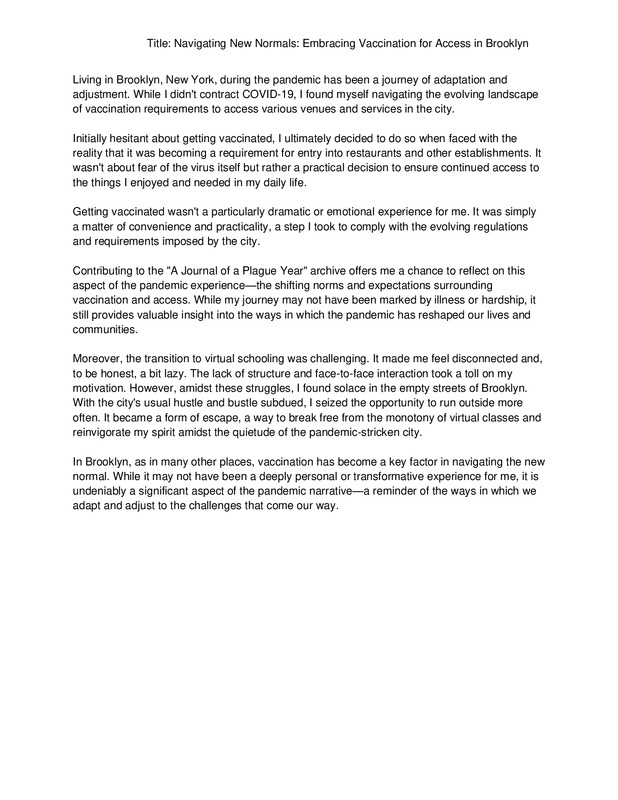 2020-07-07
2020-07-07Title: Navigating New Normals: Embracing Vaccination for Access in Brooklyn
This shows my point of view and experience to the pandemic -
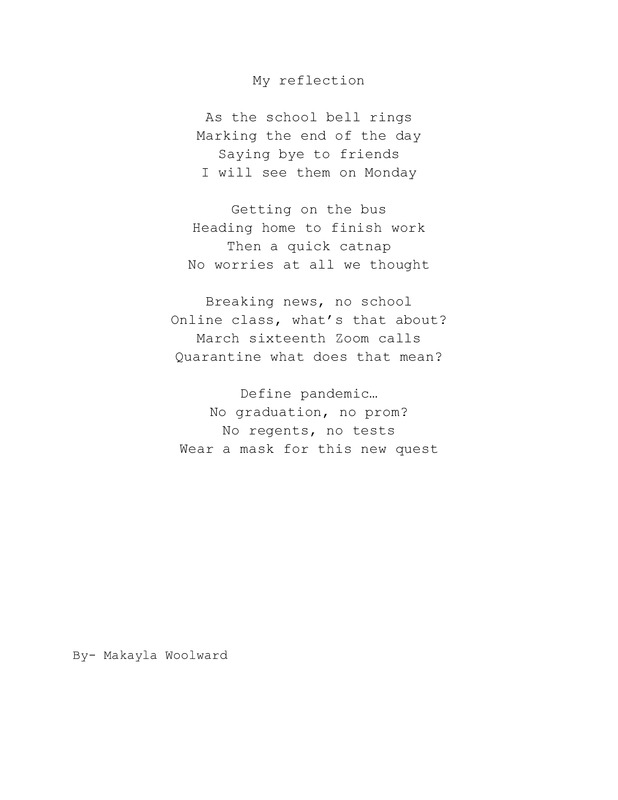 2021-03-16
2021-03-16March 16th.
Being in high school going about my normal day and later finding out that we will not be attending school until further notice. -
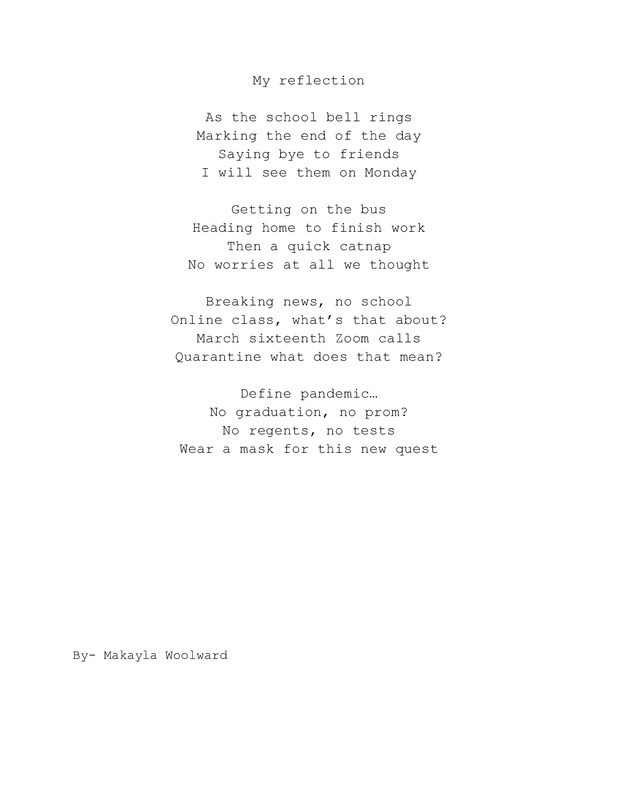 2020-03-16
2020-03-16Makayla Woodward's Reflection
A haiku poem of my experience on the school day before quarantine started and when it was announced. This poem is important to me because it shows a high school student's perspective on the pandemic. Many did not know the meaning of the events occurring not knowing how it would impact the rest of our lives. -
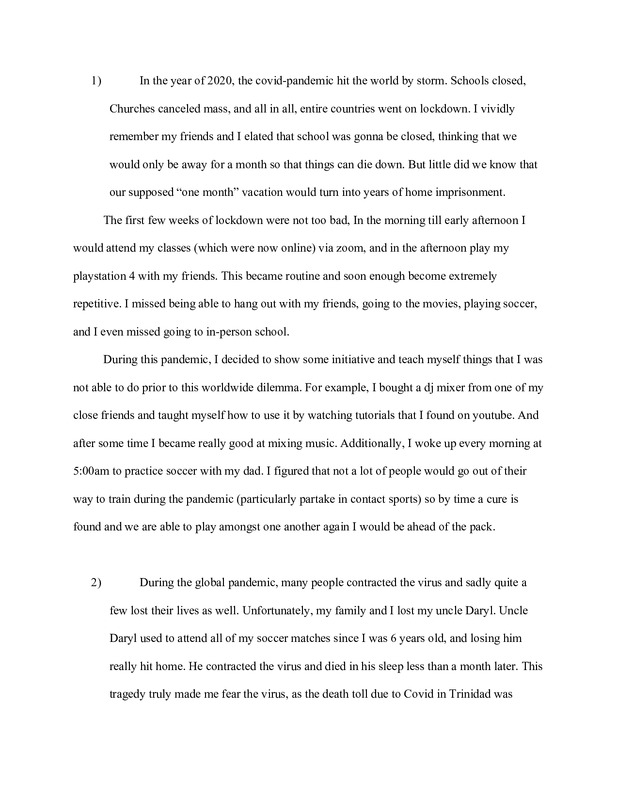 2020
2020Life of a Trini during the Covid 19 Pandemic
My story talks about difficulty I experienced during the pandemic -
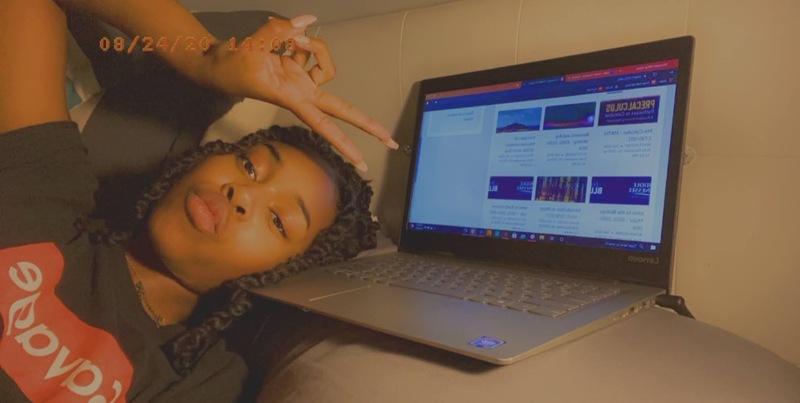 2020-08-24
2020-08-24First Day of School Picture
The picture I chose to add to the archive is my first day of school on August 24, 2020. In this picture, I was laying in bed with my laptop because everything was online. If you were lucky, you got a professor that taught class on Zoom. That is the closest to being in a regular classroom as it got. You were able to see your classmates (if they turned their camera on), you could have discussions with everyone, ask the professor questions and get immediate answers. On the other hand, you could get stuck with a professor who chose to use youtube videos and websites instead of teaching. These were the worst, poor to almost no teacher-student interaction, just discussion boards and Google. It was impossible for me to learn like this, I felt like I was not being taught! It was always stressful when trying to do assignments for classes like this because I did not understand the curriculum. If I needed to contact my professor, I just had to send an email and hope they would email me back soon with answers. Sometimes, I would not get a response until days later, a few times I never got a response. After a while of this, I started to feel miserable, stressed, and depressed. My grades started getting lower and lower and knowing how much school costs, knowing that I was going to lose my grants and scholarships because I was failing, I started having anxiety attacks. In my head, I kept saying, “I cannot learn like this, I know I am going to fail, so why keep trying?” Things got to a point where I would open my laptop, look at my assignments, cry, and then just close my laptop back up. I lost all my motivation and I lost sight of my dreams to be an optometrist. I remember the day that I dropped out, the defeat that I felt, feeling like a complete failure. -
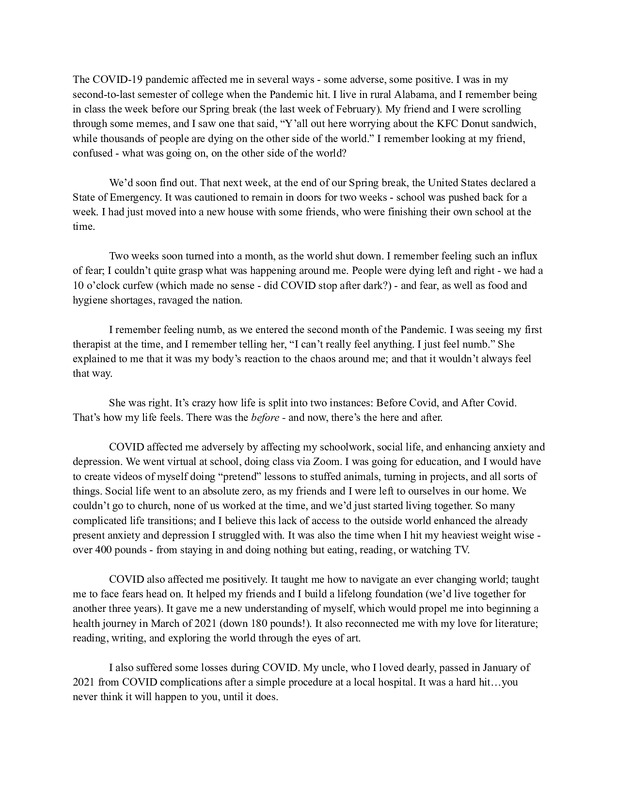 2023-07-19
2023-07-19COVID-19 Archive Story_H. Crowder
I have uploaded a personal story of how COVID-19 impacted my life; and how, in my mind, there is a before and after, two different sections of my life. I also observe the changes that were influenced by the Pandemic. -
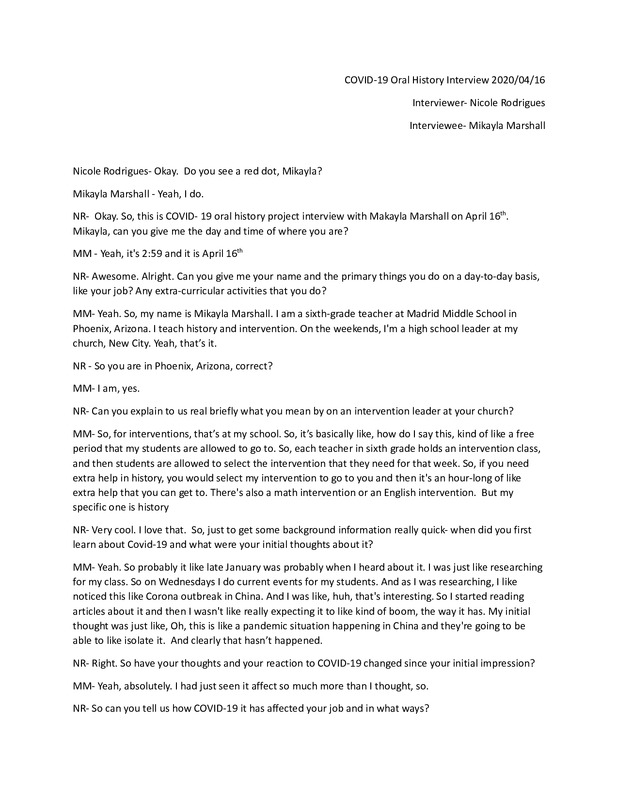 04/16/2020
04/16/2020Mikayla Marshall Oral History, 2020/04/16
-
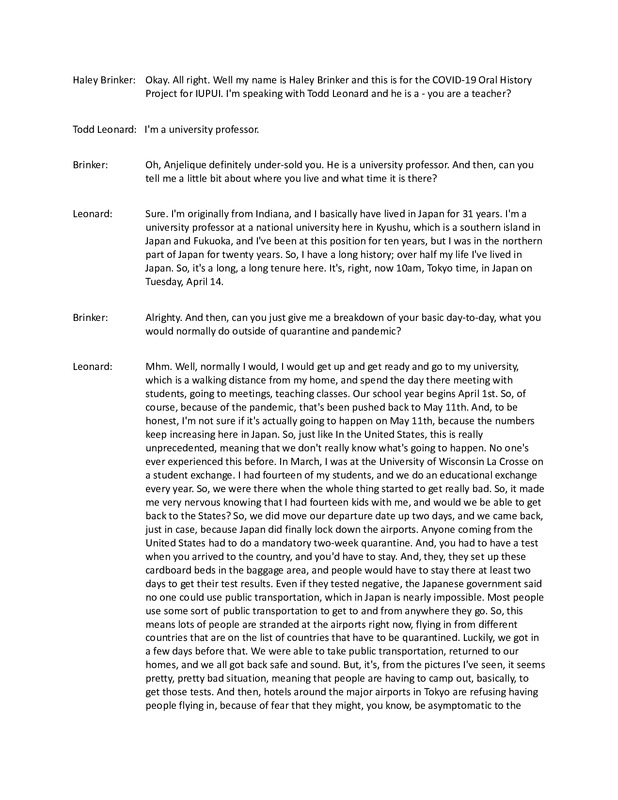 04/14/2020
04/14/2020Todd Leonard Oral History, 2020/04/14
-
2020-12-10
My pandemic mental condition
During pandemic, I was in the online English Bridge program of my university. The amount of assignments were a lot, and all I did during the pandemic was just waking up at 5am, eating break fast, going to class on zoom, eating lunch, doing assignments, eating dinner, and sleep. I could not even going grocery store to buy food or snacks because I could not finish assignments unless I just kept studying. Thus, in my room, I was alone and studying without any joy. My family supported me a lot for my study but I felt that only I was doing what I wanted (study), whereas my family was just working and doing domestic affairs. I was so depressed because if I was not existed, I did not let my family work so hard. I wanted to disappear at the time. -
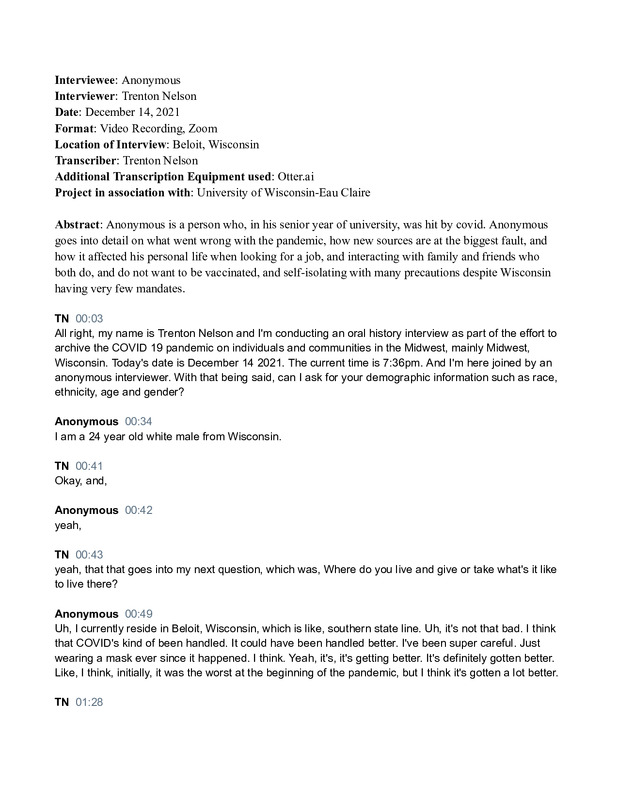 12/14/2021
12/14/2021Anonymous Oral History, 2021/12/14
Anonymous is a person who, in his senior year of university, was hit by covid. Anonymous goes into detail on what went wrong with the pandemic, how new sources are at the biggest fault, and how it affected his personal life when looking for a job, and interacting with family and friends who both do, and do not want to be vaccinated, and self-isolating with many precautions despite Wisconsin having very few mandates. -
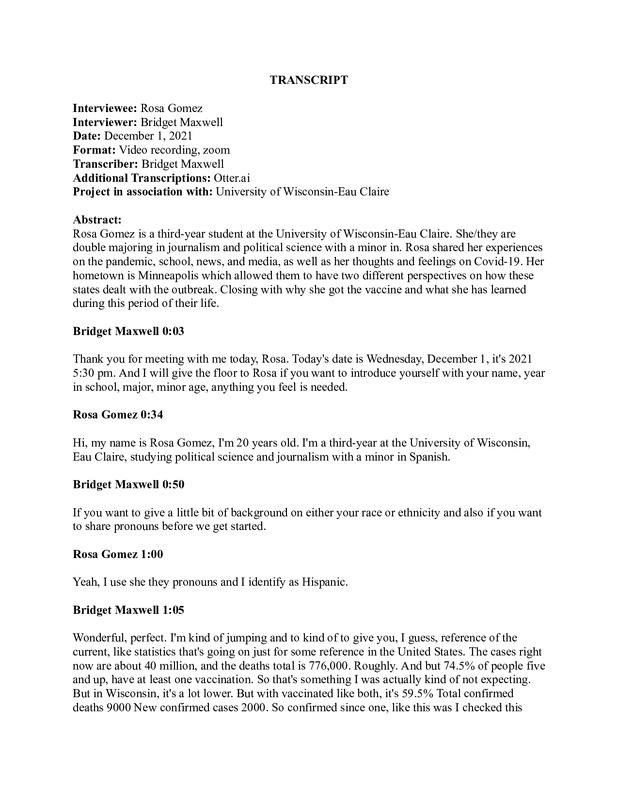 12/01/2021
12/01/2021Rosa Gomez Oral History, 2021/12/01
Rosa Gomez is a third-year student at the University of Wisconsin-Eau Claire. She/they are double majoring in journalism and political science with a minor in. Rosa shared her experiences on the pandemic, school, news, and media, as well as her thoughts and feelings on Covid-19. Her hometown is Minneapolis which allowed them to have two different perspectives on how these states dealt with the outbreak. Closing with why she got the vaccine and what she has learned during this period of their life. -
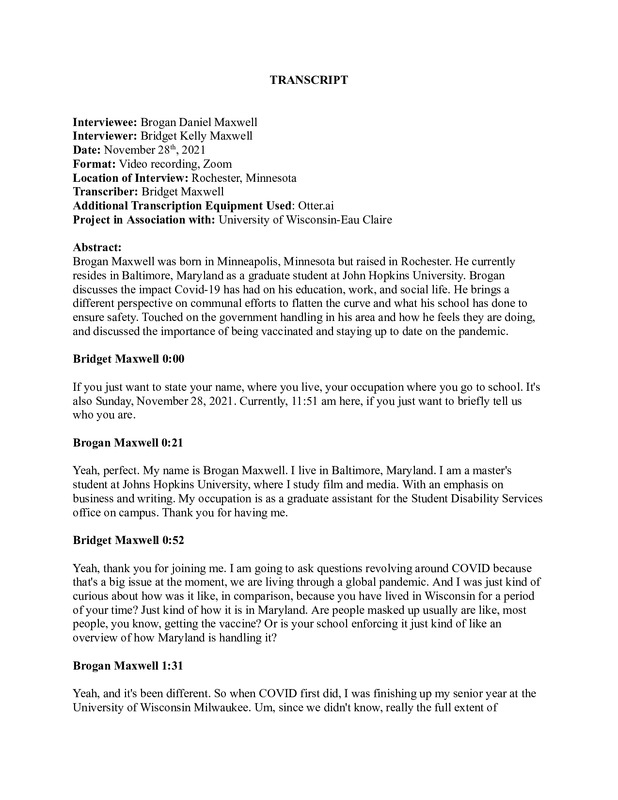 11/28/2021
11/28/2021Brogan Daniel Maxwell Oral History, 2021/11/28
Brogan Maxwell was born in Minneapolis, Minnesota but raised in Rochester. He currently resides in Baltimore, Maryland as a graduate student at John Hopkins University. Brogan discusses the impact Covid-19 has had on his education, work, and social life. He brings a different perspective on communal efforts to flatten the curve and what his school has done to ensure safety. Touched on the government handling in his area and how he feels they are doing, and discussed the importance of being vaccinated and staying up to date on the pandemic. -
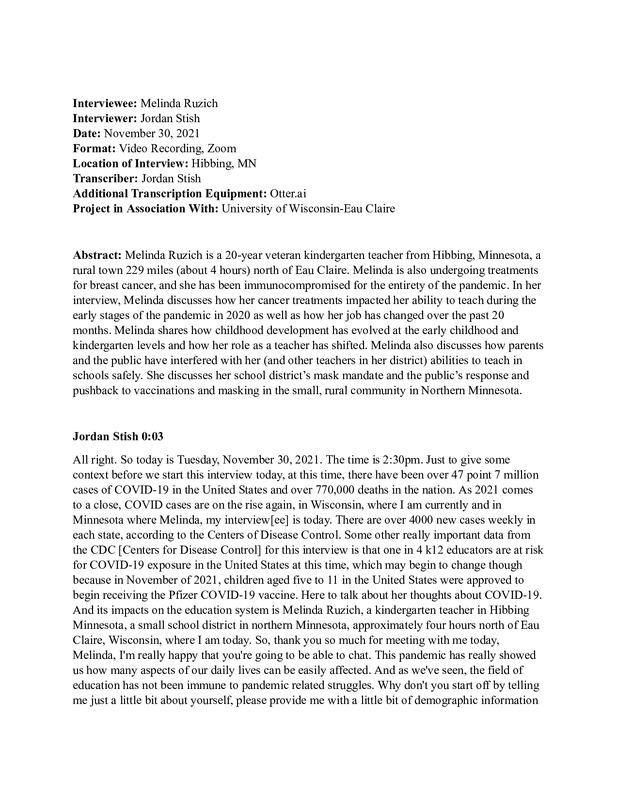 11/30/2021
11/30/2021Melinda Ruzich Oral History, 2021/11/30
Melinda Ruzich is a 20-year veteran kindergarten teacher from Hibbing, Minnesota, a rural town 229 miles (about 4 hours) north of Eau Claire. Melinda is also undergoing treatments for breast cancer, and she has been immunocompromised for the entirety of the pandemic. In her interview, Melinda discusses how her cancer treatments impacted her ability to teach during the early stages of the pandemic in 2020 as well as how her job has changed over the past 20 months. Melinda shares how childhood development has evolved at the early childhood and kindergarten levels and how her role as a teacher has shifted. Melinda also discusses how parents and the public have interfered with her (and other teachers in her district) abilities to teach in schools safely. She discusses her school district’s mask mandate and the public’s response and pushback to vaccinations and masking in the small, rural community in Northern Minnesota. -
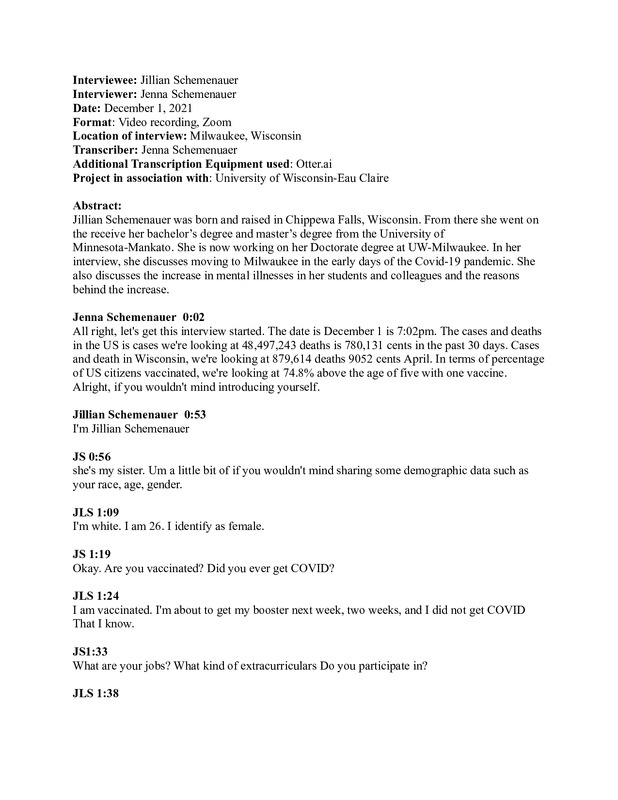 12/01/2021
12/01/2021Jillian Schemenauer Oral History, 2021/12/01
Jillian Schemenauer was born and raised in Chippewa Falls, Wisconsin. From there she went on the receive her bachelor’s degree and master’s degree from the University of Minnesota-Mankato. She is now working on her Doctorate degree at UW-Milwaukee. In her interview, she discusses moving to Milwaukee in the early days of the Covid-19 pandemic. She also discusses the increase in mental illnesses in her students and colleagues and the reasons behind the increase. -
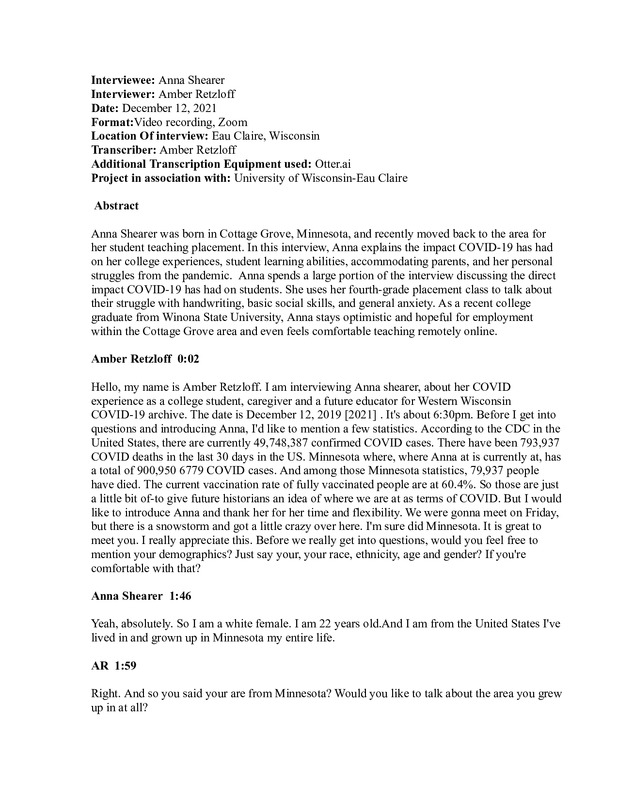 12/12/2021
12/12/2021Anna Shearer Oral History, 2021/12/12
Anna Shearer was born in Cottage Grove, Minnesota, and recently moved back to the area for her student teaching placement. In this interview, Anna explains the impact COVID-19 has had on her college experiences, student learning abilities, accommodating parents, and her personal struggles from the pandemic. Anna spends a large portion of the interview discussing the direct impact COVID-19 has had on students. She uses her fourth-grade placement class to talk about their struggle with handwriting, basic social skills, and general anxiety. As a recent college graduate from Winona State University, Anna stays optimistic and hopeful for employment within the Cottage Grove area and even feels comfortable teaching remotely online. -
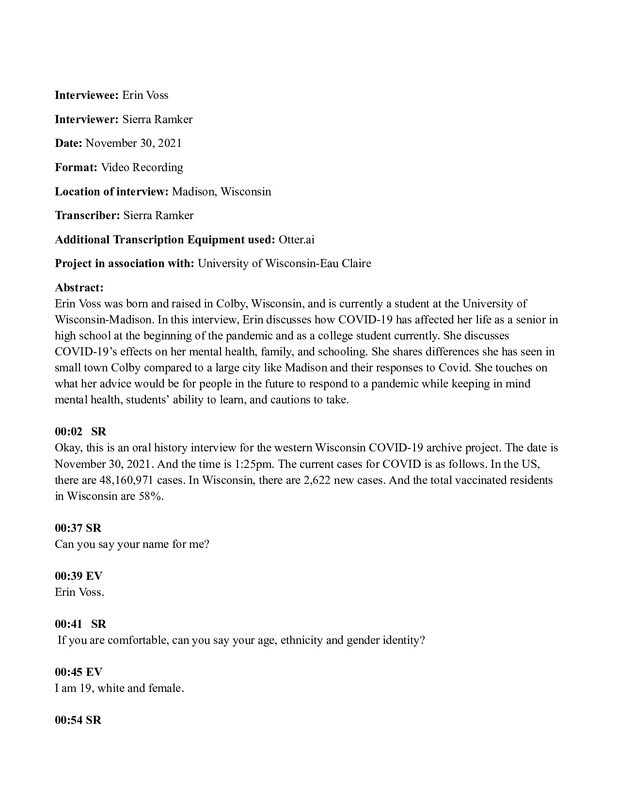 11/30/2021
11/30/2021Erin Voss Oral History, 2021/11/30
Erin Voss was born and raised in Colby, Wisconsin, and is currently a student at the University of Wisconsin-Madison. In this interview, Erin discusses how COVID-19 has affected her life as a senior in high school at the beginning of the pandemic and as a college student currently. She discusses COVID-19’s effects on her mental health, family, and schooling. She shares differences she has seen in small town Colby compared to a large city like Madison and their responses to Covid. She touches on what her advice would be for people in the future to respond to a pandemic while keeping in mind mental health, students’ ability to learn, and cautions to take. -
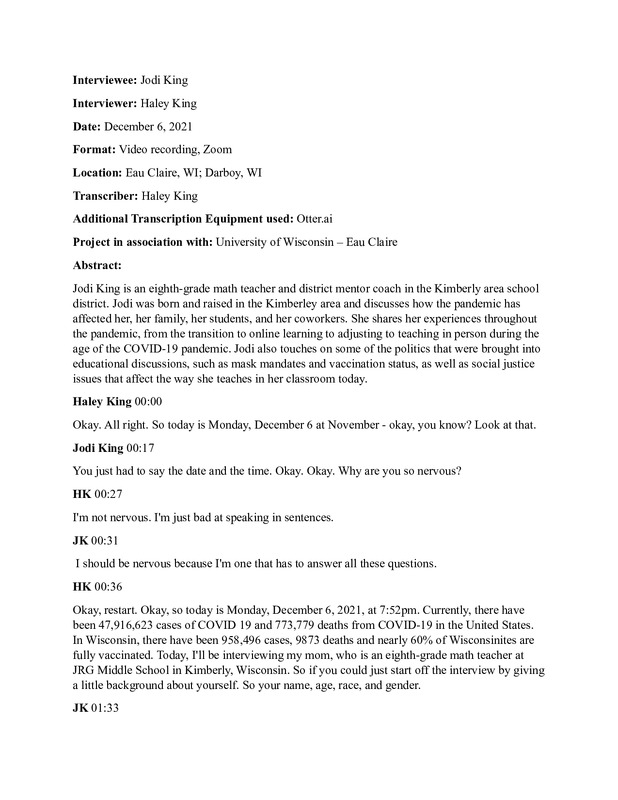 12/06/2021
12/06/2021Jodi King Oral History, 2021/12/06
Jodi King is an eighth-grade math teacher and district mentor coach in the Kimberly area school district. Jodi was born and raised in the Kimberly area and discusses how the pandemic has affected her, her family, her students, and her coworkers. She shares her experiences throughout the pandemic, from the transition to online learning to adjusting to teaching in person during the age of the COVID-19 pandemic. Jodi also touches on some of the politics that were brought into educational discussions, such as mask mandates and vaccination status, as well as social justice issues that affect the way she teaches in her classroom today. -
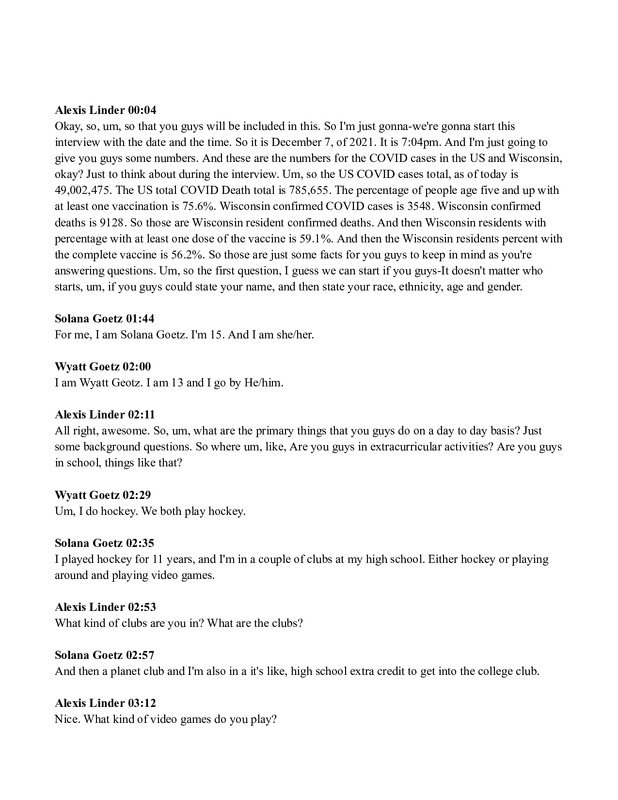 12/07/2021
12/07/2021Wyatt Goetz and Sloana Goetz Oral History, 2021/12/07
-
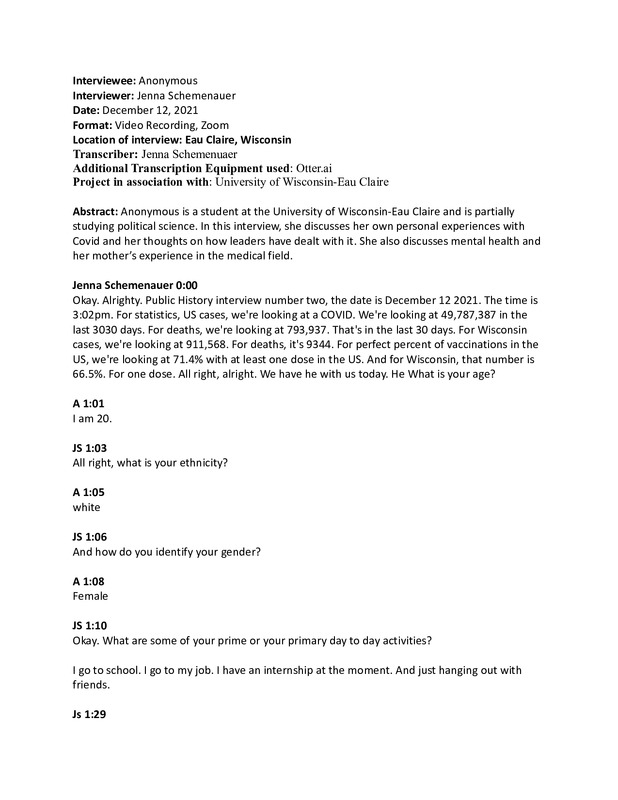 12/12/2021
12/12/2021Anonymous Oral History, 2021/12/12
Anonymous is a student at the University of Wisconsin-Eau Claire and is partially studying political science. In this interview, she discusses her own personal experiences with Covid and her thoughts on how leaders have dealt with it. She also discusses mental health and her mother’s experience in the medical field. -
 2023-03-20
2023-03-20Disorientation: The Feeling I had on March 11th, 2020
What Happened on March 11th, 2020 -
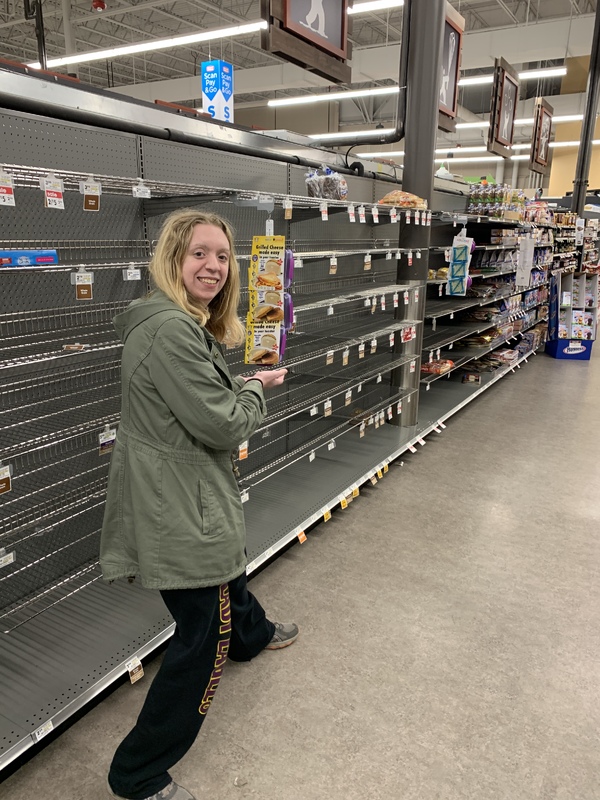 2020-03-13
2020-03-13Bread?
Before this was taken, I found out school would be online for the rest of the semester heading home for spring break plus two weeks. Boy if only I knew what I know now... -
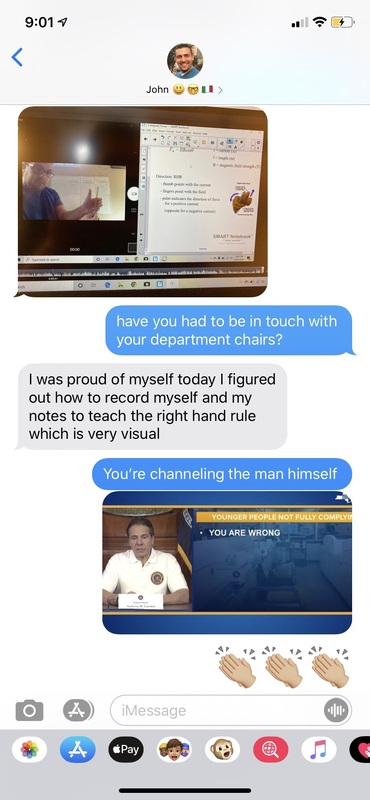 2020-03-25
2020-03-25Teaching in the "New Normal"
My friend John is a high school math and physics teacher on Staten Island. On March 25, 2020 he sent me photo of his laptop screen. Schools had been closed for about ten days and he, like many other teachers across the state, had to improvise how to continue educating in this radically new reality. He wrote, “Proud of myself today. I figured out how to record myself and my notes.” I compared it to the setup of Governor Cuomo’s daily press conferences which were a unifying and relied-upon source of information in those early days of the pandemic. When I asked him to reflect on that lesson he said: “That early in the pandemic I was lucky I was good with tech so I immediately started recording lessons for students to watch asynchronously. In my mind it was the best way to keep continuity. (I would bet at that time I thought we would be back in school before the end of the year). That lesson in particular is very visual (the right hand rule) so I wanted to figure out how to have notes on the screen and myself to be able to show how to use the right hand rule. I tried to do as closely, as I could, what I would have done in class. I tried to have the students continue hearing from me. The videos were posted so students could learn asynchronously. I did host some live sessions where they could ask questions on anything they learned. We could not mandate synchronous learning because families could have multiple students sharing a computer or even parents who now needed to work remotely, etc. That policy changed in Sept. 2020 when we gave out laptops so we could say you have your own meet at your normal class time.” -
2020-03
Old dog/new tricks! a new way to teach.....
I finally became a video star.....that was never my intention when I started teaching fifty years ago! I am an adjunct art professor. When lockdown came and I couldn't teach in person, I had to find a new way to teach my class.....Zoom felt too complicated to me so I communicated with my students via email and videos that my husband and I made in the basement! A 15 minute video took over 3 hours or more between the filming and the editing! In addition, I really had to work hard to find the best way to communicate-the most effective way to present the lesson, as no questions could be asked as I presented the material. It really got me to think and be very clear about the subject and the best way to teach it. Once in front of the camera, I made believe I was talking to my class and just ran with it! I felt comfortable once I started. It was funny though, as we had to carefully think about camera angles and outfits that worked well as I moved! After all, this was permanently on tape...And, I had to be brave! My Brooklyn/StatenIsland accent was forever heard, as well as facial features, expressions and body parts that have always plagued me be forever seen! Overall, though, a great experience!!!! Who would have thought that such an awful, disturbing period could bring about new, positive experiences! Ah, but that is life after all, isn't it? -
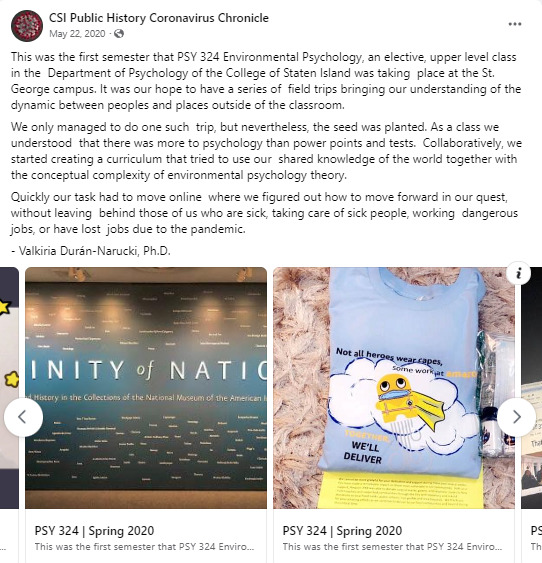 May 22nd, 2020
May 22nd, 2020Environmental Psych. First Semester!
This was the first semester that PSY 324 Environmental Psychology, an elective, upper level class in the Department of Psychology of the College of Staten Island was taking place at the St. George campus. It was our hope to have a series of field trips bringing our understanding of the dynamic between peoples and places outside of the classroom. We only managed to do one such trip, but nevertheless, the seed was planted. As a class we understood that there was more to psychology than power points and tests. Collaboratively, we started creating a curriculum that tried to use our shared knowledge of the world together with the conceptual complexity of environmental psychology theory. Quickly our task had to move online where we figured out how to move forward in our quest, without leaving behind those of us who are sick, taking care of sick people, working dangerous jobs, or have lost jobs due to the pandemic. -
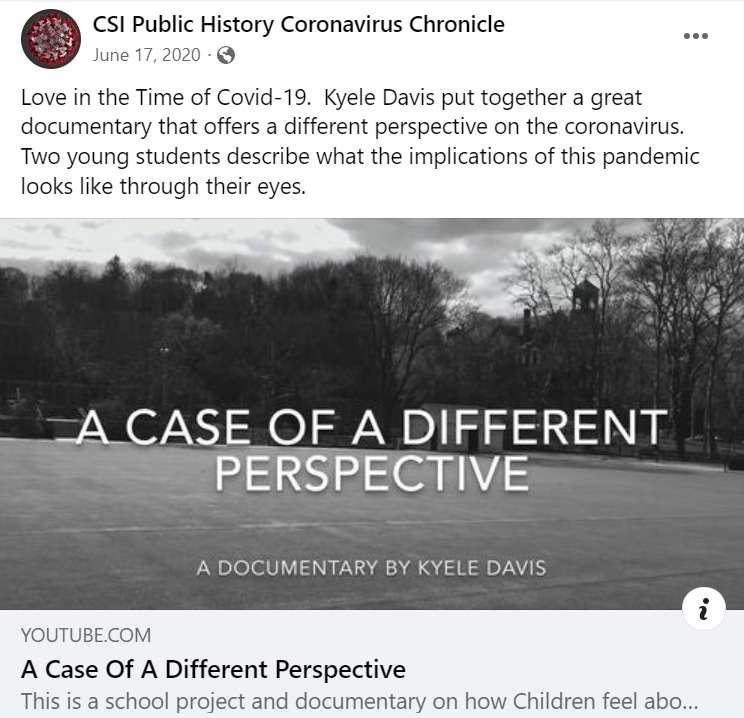 2020-06-17
2020-06-17A Case of a Different Perspective
Youth, Students, Perspective -
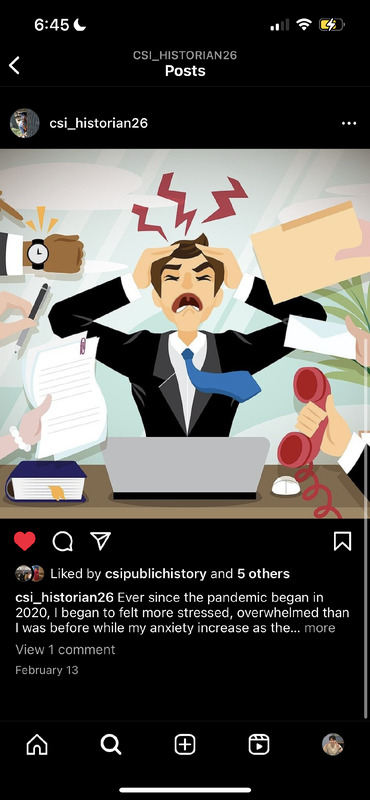 February 13th, 2023
February 13th, 2023Status of Mental Health During Lockdown
I was overwhelmed and stress when we went to online classes. The photo I posted is a representation of how I felt during that time -
2020-03-15
Life during COVID 19
My experience living during COVID 19 was unforeseen. It was my senior year of high school during the year of 2020 when I first heard of the term "Coronavirus." Being a student athlete at this stage of my life, I was looking forward to several upcoming events, such as Prom, my last outdoor track and field season competing as a distance runner, and graduation. When March 2020 arrived, everything came to an abrupt change for the worse. I suddenly found out that all of the current classes I was taking was forced to be online. The outdoor track and field season I was training for with my teammates and all of the goals that I set for myself were abandoned. The graduation I was looking forward to was held on a pre recorded video instead of a traditional in person setting. What I have learned from the pandemic is that some things will not go as planned, no matter how much time and devotion goes into a particular event. Telling this story is important to me because it can let other future generations acknowledge what happened during these uncertain times and what things can be prevented from happening later on. -
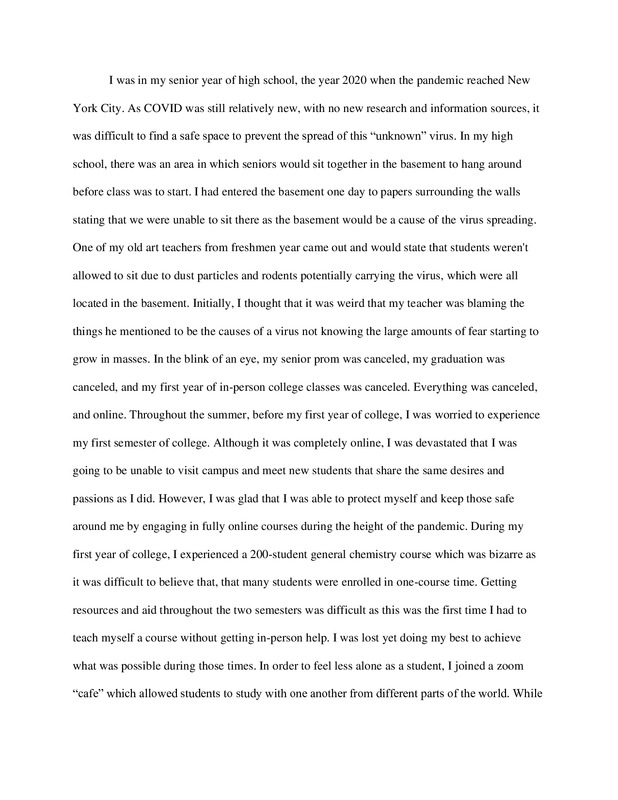 2020-08-05
2020-08-05Only Student on Campus: My First and Second Year at College
The item that I am submitting describes my life as a student throughout my senior year of high school toward my first year of college. I emphasized the feeling of being alone and dealing with the college on a fully virtual level. As months passed it was important to validate the experience and the growth from being in an online setting to an in-person setting. -
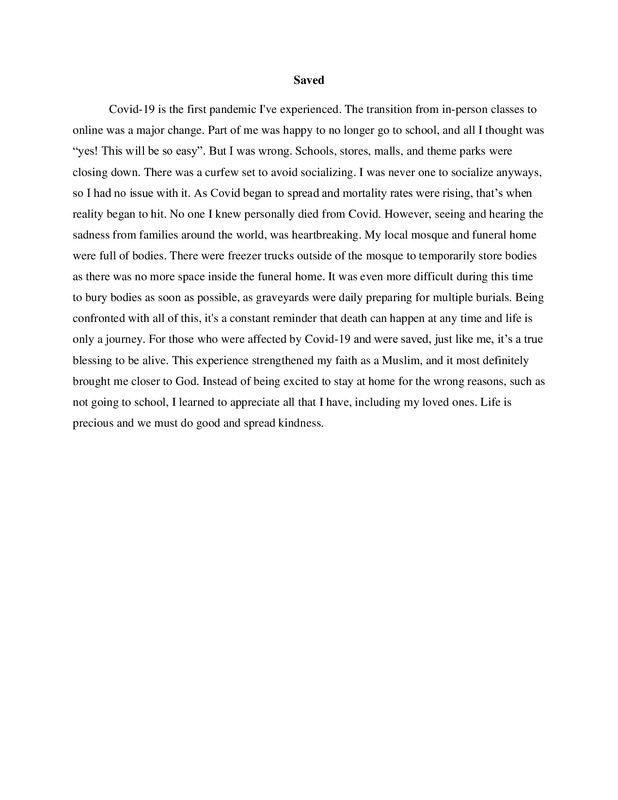 2020-04
2020-04Saved
The pandemic has not only been a devastating experience but a time of reflection. -
2020-03-06
The Two Week Break
My Junior year at Midwood High School took an expected turn as a national emergency was declared on March 13, 2020. I remember watching the news with my mother, excited to see I would have two weeks off from school. My mother and I would both be home as all non-essential businesses moved to remote or closed down indefinitely. I immediately messaged my friends about the two week break, planning to play video games all day long. We spent those two weeks staying up late as if it was an extended spring break. Little did I know that those two weeks would turn into months of isolation, living in fear of going into the outside world. I feared for my father as he was a registered nurse at Woodhull Hospital. Not only did he have to go outside everyday for work, but he would be face to face with patients, many sick and dying from this new virus that took the world by surprise. There was no vaccine for almost an entire year, so all he could rely on were masks, gloves, face shields and hair nets. My father and many other medical workers were needed overtime to deal with the immense amount of patients coming in everyday. As he came home from work my mother would bring his clothes and leave them by our front door. I worried for him at work as I feared he could get this virus that we were still learning about. Thankfully he never got sick with Covid-19 during the early pandemic, and with the new vaccines in development many of our fears were put to rest. After almost two months of not having any classes we were introduced to remote learning through zoom and google classroom. It was a very new experience for my fellow classmates and I, but it was nice not having to leave your bed to go to class for a while. However that relief of not waking up early to go to class turned into yearning to go to school and seeing my friends. Waking up every morning to see a screen filled with blank profile pictures with names made me feel very lonesome. I would never imagine missing going to school, but it was something that I had taken for granted. In my senior year of high school there was the option for hybrid learning which I was very excited about, but I'd later find out that there would only be rows of desks set up in my school gyms we used for physical education. It wouldn't be the everyday schedule of switching classes and seeing my friends in the hallways and library. I ended up doing another year of remote learning which was very draining but I managed to do well in all my classes with nothing else to do. Unfortunately I did not have a prom or senior trip, but I was very lucky to have an in person graduation and see all of the people I once saw everyday again. This story of the pandemic is very significant to me as it taught me to never take things for granted as everything can change in a moments notice. The things I'd known as my everyday routine of school and hanging out became a distant memory for a long time until numbers and fears of the virus fell. Being able to go to campus now and have a regular life again is something I will now cherish forever. It is still somewhat hard to socialize again after being isolated for so long, but I have made some friends along the way and I look forward to all the memories that await me in the future. -
2020-03-13
In the Blink of An Eye
Maybe if quarantine lasts three weeks, we’ll have spring break before we go back to class, I wistfully think to myself. It’s already March 13th of 2020, but the air is still nippy and my mom still makes me wear that atrocious parka. She’s been hearing all these reports about the coronavirus, and I think it’s releasing her inner germaphobe. My school day finishes off like any other, except I have to stay behind for AP Biology review, like who has review two months before an exam? Following an hour full of practice problems, workbooks, and texting my friends under my desk, it’s finally time to go home. The talk of the school is if Xaverian plans on closing for quarantine, following the footsteps of nearly every other Catholic school in the city. But I don’t even take two steps out of my desk before my iPad pings with an email. One by one, we all find out that Xaverian will be closed for the foreseeable future, and that online learning will commence on Monday. I picture using this new interface, Zoom, for class. A feeling of exhilaration grows in my chest. I can already picture it: no uniforms, and no restrictions—just a newfound capacity for freedom. Our group parades towards the lockers, gossiping while packing up our books and putting on our coats. The moment doesn’t feel real; it feels like I’m floating, suspended in the joyful innocence of being a high school senior. With our navy and khaki skirts swishing around our legs, knees exposed to the frigid air, my three friends and I begin the trek home through Bay Ridge, blissfully ignorant to the fact that it would be the very last time we ever put those uniforms back on, or that it would be three months before we saw each other next. How naïve we were walking home that day, discussing how fun and convenient online learning would be. We chat about prom dress shopping, boys, and how funny it would be to take AP exams online—not realizing that prom would be canceled, and that we would take those exams online. It was my last day of normal, the last day before everything changed for good. Three months later, I graduated high school from my porch, wistfully smiling as I was handed a trophy for becoming the Salutatorian of Xaverian High School’s Class of 2020. The following week in June, I stand on those same steps in funeral clothes, wondering how everything changed in the blink of an eye. Not even seven days after graduation, my grandma passes away alone at Staten Island University Hospital, unable to be accompanied by her family because of COVID-19. It comes out of the blue; she feels fatigued and lethargic, but refuses to get medical attention until the very last moment because of possible exposure to the virus. By the time she arrives at the hospital, they admit her in stable condition, but she never makes it through the night. As of June 20th, 2020, 176,066 Americans are dead from the coronavirus. My grandma didn’t have it, but I can’t help counting her as the 176,067th life taken away by this disease. Because of COVID-19, she skipped her doctor’s appointments, and lived in complete isolation to avoid contracting the virus. Yet in the end, it is the virus that indirectly takes her away, preventing any of her loved ones from being present in her final moments. Nearly three years later since that last day of high school, on February 21st, 2023, I can reflect on how much my life has changed. COVID-19 went on to rob me of my first two years at Brooklyn College–I spent them cooped up in my bedroom on Zoom, not meeting my newfound friends until my junior year of college. COVID-19 influenced me in my choice to be a Health and Nutrition Science major, as I hope to learn more about preventing disease and use my knowledge to make me a better physician in the future. Millions have now died from COVID-19, and my version of “normal” has forever changed. Three years ago, the future seemed bleak and dire. I still wear a mask on the train, but now I see hope in the future because of our vaccine development and how normalized it’s become to talk about public health. I can only hope that as time goes on, humanity works together to regain a sense of normalcy. -
2020-03-06
Going Home
At the start of the pandemic I was a freshmen in college at the University of South Carolina. We went on Spring Break and never came back to school for the rest of the semester. Classes were all online for about the next year, but I rented an apartment in Columbia so I could still be at school. -
2020-12
Hawaii - December 2020
In March of 2020 my family and I were supposed to go to Hawaii for our spring break. When I was at work around St. Patrick's day, the school administration announced that all sports were postponed because of covid-19. A couple of days later I found out that we would be moving to virtual learning until spring break. During this time I remained hopeful that we would be back in the classroom after the break and that I would still be able to visit Hawaii. As the weeks went on it became clear that this was not the case. Eventually we moved to permanent virtual learning and the airlines canceled and refunded my ticket for Hawaii. As 2020 continued on I became more and more frustrated over the impact of covid, especially as what seemed like 3 weeks at home, turned in to several months without travel and in person interaction. In December of 2020, after completing a semester of half virtual, half in person learning I was in need of a break and a change of scenery. On Christmas my family and I found really cheap flights to Hawaii, however these flights were leaving the next day. Since I was a teacher on Christmas Break I had the time off, the only issue was that we needed to get a negative covid test before landing in Maui. We quickly booked the flights and scrambled to find a place we could get a covid test. In order to get off of the plane in Hawaii we needed to take a covid test 12 hours before arrival and our results needed to be negative. We did not have enough time before our flight to have a test shipped to our house nor did we have enough time to wait 2-3 days for results. Luckily we found a place 45 minutes from where we lived that had an opening for four rapid tests. After acquiring our test, 18 hours before our flight we eagerly awaited the results. All four of us had a negative test and we were able to board our flight to Hawaii. When we landed in Hawaii, in order to get off of the plane we had to show our negative test results. If someone did not have test results they had to remain on the plane and wait for it to return to the mainland. After showing our tests, we had our temperatures taken again and and our visit, including our accommodations, had to registered. The remainder of our trip to Hawaii was relaxing. Although it was weird to walk on the beach with a mask and sit far away from other guests, it was nice to get away. While we were in Hawaii I remember talking to a waitress we had that explained that from March to July residents were not allowed to enjoy the beaches. She described how lonely and isolated she felt stuck in her small apartment by herself. Even though it was difficult to get to Hawaii during covid, we needed a getaway and the hospitality workers in Hawaii were glad to see things slowly picking up again. -
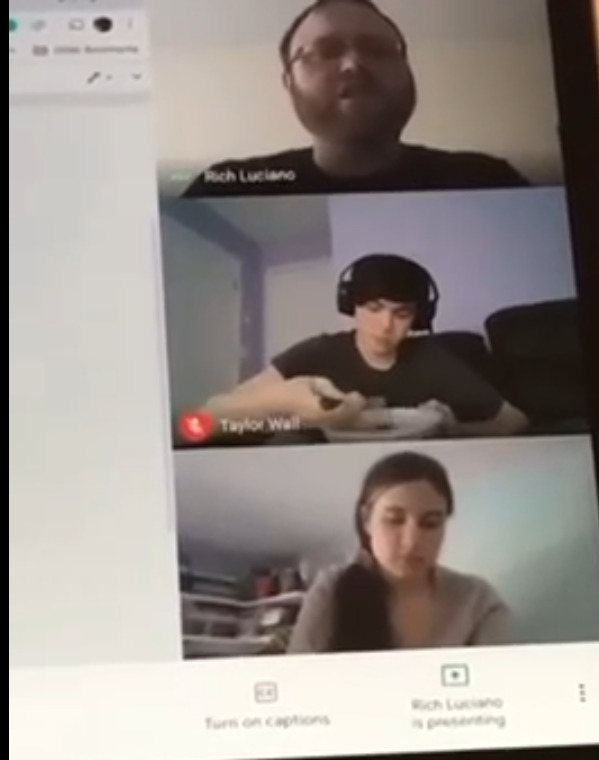 2020-03-19
2020-03-19Eating Food in Class
This is a video my friend shared with me at the beginning of the pandemic of him eating food in class when he believed his camera was off. -
2020-03
Zoom, Kraft Mac & Cheese, and Avatar the Last Airbender
These three things basically sum up how I spent my days during the lockdown of the pandemic. I would go on Zoom for class, would typically make some Kraft mac & cheese for lunch or dinner, and would binge watch Avatar the Last Airbender on Netflix. Sometimes I did a combination of both; I remember eating mac & cheese and playing hangman with my friends on Zoom. These are three things that I associate with quarantine. -
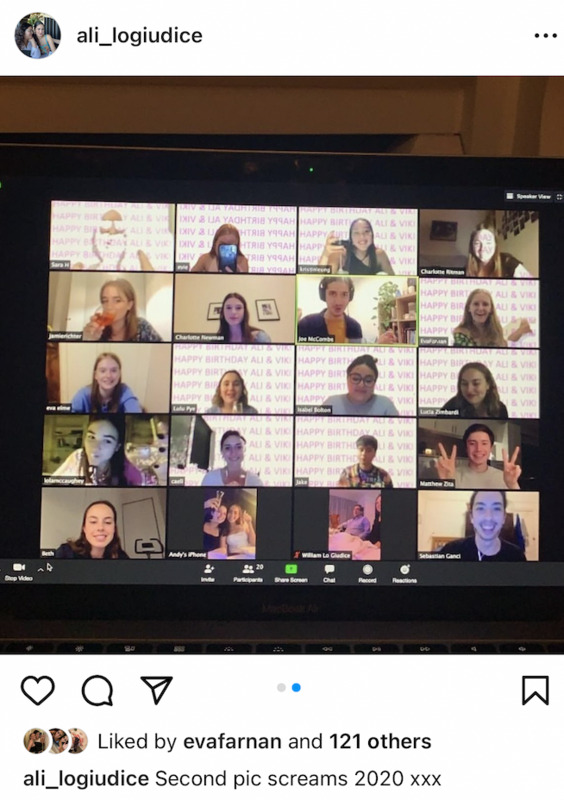 2022-10-31
2022-10-31Reflecting on COVID19 as a student who started and ended her degree in the midst of the global pandemic. (HIST30060)
I’ve selected 5 different photos which give a little insight into being a tertiary student during the COVID19 pandemic. I started my Bachelor of Art degree in March of 2020, fresh out of high school. I was so incredibly excited and had a great first few weeks (I think one or two) and O-Week. I was lucky enough to go on a first year Arts student camp in February, where I made a handful of friends that I am still close with today; it was this small social interaction that really served as the bulk of my Uni social life for my degree because ‘going online’ severely stunted my ability to connect with new people. In the screenshot of a Zoom conference call, I am having a zoom call with some of the people I meet on this camp, a kind of ‘reunion’ during the first lockdown in 2020. Reflecting on some of the other limitations on the social life of a young student who is very social, I have included a screenshot of an Instagram post I did in April of 2020. It was my 19th birthday, and my ‘obligatory’ birthday post for the year looked a lot different to other years. Rather than being out celebrating with friends in real life, we did a group zoom call where we sang Happy Birthday and my friends watched me cut my cake through a screen. Some people got dressed up, donning dresses and a full face of makeup, to just wash it off when you clicked the camera off for the night. It was lovely to connect but looking back at these pictures now just leaves me with a strange, eerie feeling. I have included a picture of my university set up, a table in our garden and my dog, Margot. I found it really hard to study in my house all the time, so I would often try to move around to different study zones in my house. I really focused on my study during lockdown, it felt like it was a productive use of time and something I could channel my thinking into. However, thinking so much about University, and always having it in my home (it was not like I was moving between a ‘home space’ and a ‘study space’) was really tiring and draining. Every day just felt the same. I have decided to take a gap year next year rather than moving straight into post-graduate study because I don’t want to feel that same kind of burn-out again. Finally, I have two pictures which encapsulate some pass times during lockdown. One is my sister painting my bedroom walls; we did a lot of home improvement and beautification, giving ourselves little tasks and jobs that we could complete and feel satisfied with. The other picture is my sister and dog on the beach during a winter’s eve walk. I included this picture because her mask is visible. This picture was taken when there were restrictions about the quantity of family members you could walk with, the time you could leave your house, the necessity of wearing a mask and how far you could go from home. When this picture was taken, we had a curfew in place in Victoria (I think you had to be home before 10pm), you could only walk with household members, but only in groups of two at a time, you could not go further than 5km away from your home and you had to wear a face mask even when just walking your dog to a quiet beach. Reflecting on these harsh rules and the feelings I had at the time makes me feel quite sad as I feel like I missed out on so many experiences that I was promised with my university degree. My experience as a Bachelor student was so far from what it should have been; so while I am extremely proud to be graduating in a few weeks, proud that I loved what I studied, felt empowered by what I learnt and feel like my academic skills have improved so much, I feel sad that I missed out on social connection, a sense of belonging to a school community, meeting people who are outside my regular circles, experiences with clubs and teams, not being able to use campus facilities and spaces. I am so lucky that I was extremely privileged in the lockdown, my family was all healthy, safe, we had minimal arguments, and they made me smile despite the circumstances; my friends were beyond wonderful, and I had a safe place to live and access to my university and learning online. But when I think back to the lockdowns and the impact of them, I still can’t help but get emotional. More than anything, I always find myself shocked about what we all went through and how unique it was. -
 2020-08-11
2020-08-11Virtual Learning in California
The American response to the global COVID-19 Pandemic was multi-faceted. However, of specific importance to the nation were the changes made to public education. As the Pandemic resulted in the closure of businesses, teachers and students were required to continue their educational programs online from the privacy of their homes. Although the effects of distance learning will continue to be seen, virtual learning severely limited the ability of students and teachers to use sensory perception as a tool for learning and instruction. First, distance learning no longer enabled American teachers to utilize the sensory perception of “proximity.” Throughout public education “proximity” is used to encourage student engagement with both instruction and content. Many teachers will walk their classrooms during student activities and use sensory perception to sensorially inform students that they are near to them and are assessing their engagement. Teachers use this strategy as a reinforcement tool to develop students’ ability to stay on task. Yet, during the COVID-19 Pandemic, social distancing policies made “proximity” not only impossible, but also illegal, limiting to what extent teachers could use sensory perception to foster engagement and learning. Second, not only were educators no longer allowed to use the sensory perception tool of physical proximity, but also many educators were forced to rely solely on the sensory perception of sound. School districts throughout the state of California, for example, did not permit educators to require their students to verify their attendance in live video format. The result was educators and students were engaging predominantly through speaking and listening. Furthermore, being denied the sensory perception of sight, educators could not assess to what extent students were engaging with instruction and activities. In conclusion, the COVID-19 Pandemic enacted emergency response strategies which directly affected the education of Generation Z. For both students and educators, sensory perception became more limited for every student. Yet, the sciences, including social science, are built upon the empirical information a human being receives through them. Perhaps this video will serve as evidence to answer the question, “To what extent were students denied the right to sensory information and science?” -
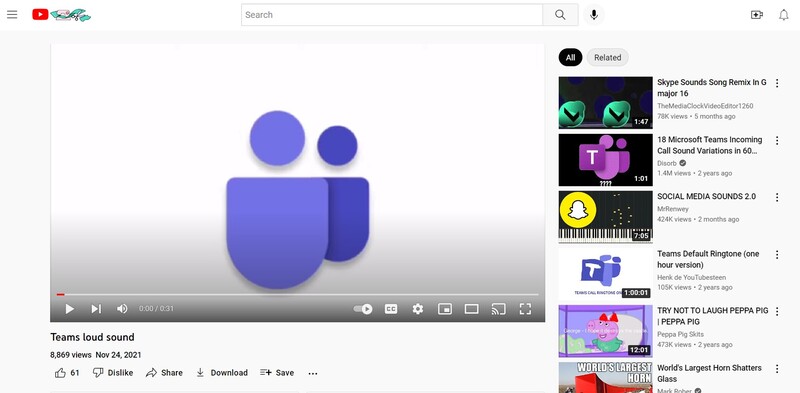 2020-03-21
2020-03-21Education changed
It was my first year teaching middle school history. I was bright-eyed, excited, and felt like I had finally found my calling in life. I went into spring break with such an excited feeling about my new career path. Coming from retail, I could finally have time to spend with my family and not have to worry about making a quota. Then the email came. We would be moving to distance learning and I would not get the chance to finish my first year as an educator with my first group of kids. The sound I most remember was the Google Meets login when someone joined. That sound will forever be associated with the pandemic. The sound I had never heard before became the sound that brought me joy as I was finally able to make sure my students were okay. I remember that sound and immediately checking to see who was logging in. It brought mixed feelings of compassion, empathy, and sadness. Even as we started to get back into the classroom, nothing would ever be the same as it once was. But that sound, that one quick sound, brought on the emotions of this educator. And I hope I will never have to hear that sound again. -
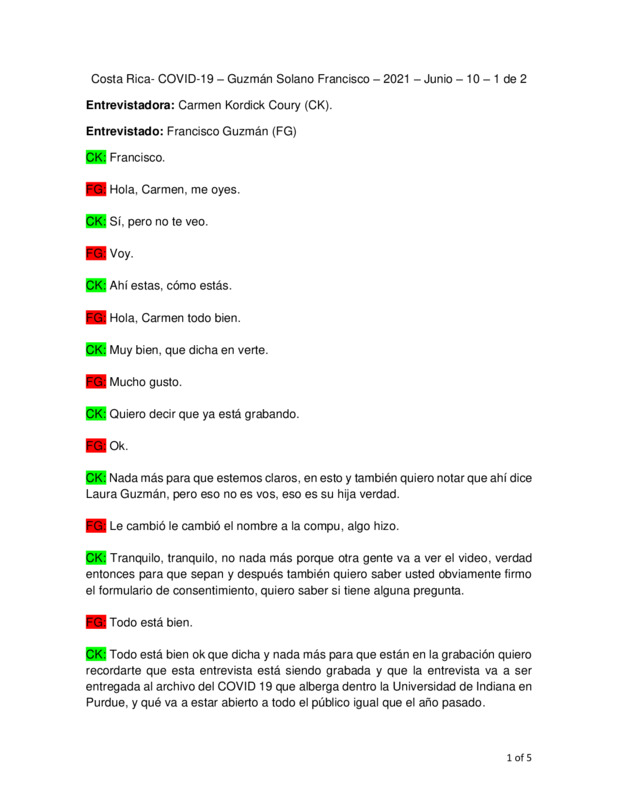 06/10/2021
06/10/2021Francisco Guzman Solano Oral History, 2021/06/21
En esta entrevista Francisco Guzman Solano es entrevistado por Carmen Kordick Coury concerniente al covid-19 en Costa Rica. Empiezan hablar de los cambios que Francisco ha visto desde el ano anterior. Hablan de la economía y el gobierno, de su trabajo y la vacuna. También hablan del aumento del crimen, de las drogas, y de las noticias falsas. De la Caja y el ministro de Salud. Francisco también habla de su familia y su hogar, de las fuentes principales de información y la sociedad. Terminan hablando de las clases virtuales de su hija, de la educación y del Ministerio de Educación. -
2020-08-11
Long-Distance Learning
The American response to the global COVID-19 Pandemic was multi-faceted. However, of specific importance to the nation were the changes made to public education. As the Pandemic resulted in the closure of businesses, teachers and students were required to continue their educational programs online from the privacy of their homes. Although the effects of distance learning will continue to be seen, virtual learning severely limited the ability of students and teachers to use sensory perception as a tool for learning and instruction. First, distance learning no longer enabled American teachers to utilize the sensory perception of “proximity.” Throughout public education “proximity” is used to encourage student engagement with both instruction and content. Many teachers will walk their classrooms during student activities and use sensory perception to sensorially inform students that they are near to them and are assessing their engagement. Teachers use this strategy as a reinforcement tool to develop students’ ability to stay on task. Yet, during the COVID-19 Pandemic, social distancing policies made “proximity” not only impossible, but also illegal, limiting to what extent teachers could use sensory perception to foster engagement and learning. Second, not only were educators no longer allowed to use the sensory perception tool of physical proximity, but also many educators were forced to rely solely on the sensory perception of sound. School districts throughout the state of California, for example, did not permit educators to require their students to verify their attendance in live video format. The result was educators and students were engaging predominantly through speaking and listening. Furthermore, being denied the sensory perception of sight, educators could not assess to what extent students were engaging with instruction and activities. In conclusion, the COVID-19 Pandemic enacted emergency response strategies which directly affected the education of Generation Z. For both students and educators, sensory perception became more limited for every student. Yet, the sciences, including social science, are built upon the empirical information a human being receives through them. Perhaps this video will serve as evidence to answer the question, “Is the right to sensory perception and scientific information included within the natural rights of life, liberty, and property?” -
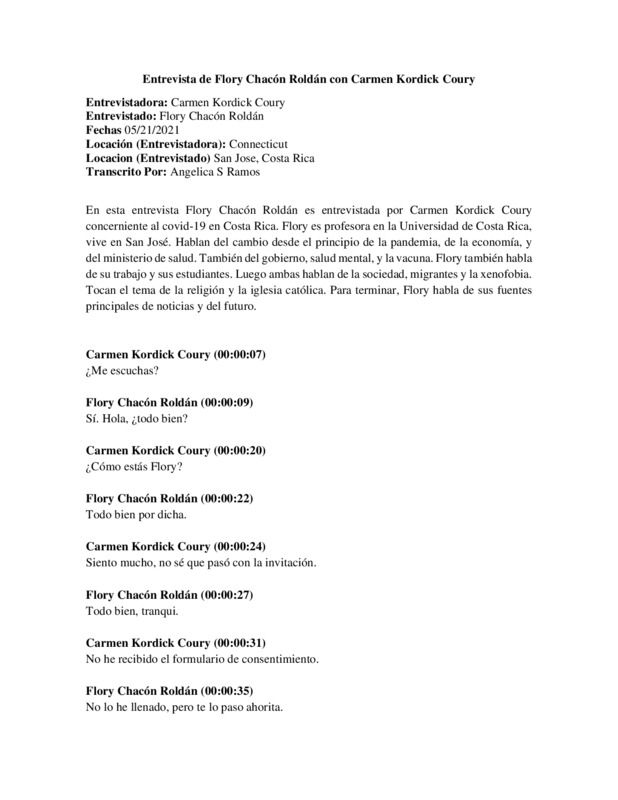 05/21/2021
05/21/2021Flory Chacón Roldán Oral History, 2021/05/21
En esta entrevista Flory Chacón Roldán es entrevistada por Carmen Kordick Coury concerniente al covid-19 en Costa Rica. Flory es profesora en la Universidad de Costa Rica, vive en San José. Hablan del cambio desde el principio de la pandemia, de la economía, y del ministerio de salud. También del gobierno, salud mental, y la vacuna. Flory también habla de su trabajo y sus estudiantes. Luego ambas hablan de la sociedad, migrantes y la xenofobia. Tocan el tema de la religión y la iglesia católica. Para terminar, Flory habla de sus fuentes principales de noticias y del futuro. -
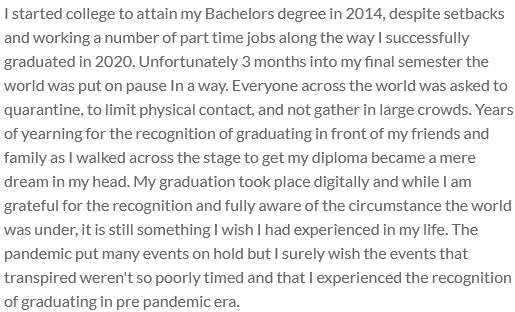 2020-06-11
2020-06-11Effects of Covid in 2020
I started college to attain my Bachelors degree in 2014, despite setbacks and working a number of part time jobs along the way I successfully graduated in 2020. Unfortunately 3 months into my final semester the world was put on pause In a way. Everyone across the world was asked to quarantine, to limit physical contact, and not gather in large crowds. Years of yearning for the recognition of graduating in front of my friends and family as I walked across the stage to get my diploma became a mere dream in my head. My graduation took place digitally and while I am grateful for the recognition and fully aware of the circumstance the world was under, it is still something I wish I had experienced in my life. The pandemic put many events on hold but I surely wish the events that transpired weren't so poorly timed and that I experienced the recognition of graduating in pre pandemic era. -
2020-03-19
LockDown
So this was the beginning of lockdown for covid-19 when it first started to get out of hand, I was trying to start my first year at my new college DePaul University. Yet it was going to be online for the first year and that is when it started to get rough from all the work I had to get done with little to no help at all from professors. They weren't opposed to helping it was just the fact that we could only find them in office hours and after class online and most of the times it was software problems that would take so long to be fixed to where it would take almost a couple of weeks to fix. When if it wasn't for covid I would be able to go in and fix it asap. It's just that the reason for this is because Covid can really affect ones learning progress and if it's something tech related it really can cause a delay for many not just students but office workers and professors etc. -
2022-06-01
Covid-19 Through the eyes of a young adult industry worker
I remember the days leading up to lock down, one of my professors was warning us that if need be we would effortlessly be able to transition the remaining weeks of class online. To my peers and I, we thought that was a little extreme to talk to us about going remote, we didn't think something that was happening in another continent would reach us so quickly. Fast forward a week or two, work was so slow we were ordering food and sitting around talking for the entirety of our shift. At the time I was a host and was getting paid hourly so I didn't mind but I didn't think about the way it was affecting our bartenders and servers. Within the next two days we were shutdown and I was filing for unemployment. Interestingly enough, that time was the most money I've ever made in my life. I was collecting 2-3x more money than I would have gotten if I was working. I changed my life style, I started nannying once August of 2022 came around because I couldn't afford to only have my hourly host pay once things started to open back up again. I was eventually given a promotion at work to Bartend once my nanny family no longer needed me since they were comfortable with the kids going back to school and day care. I was making a livable wage but it was nothing compared to what sales were before covid. It was never consistent, when the numbers began to spike people, reasonably so, would stay home and money was tight. I was so unhappy at my current job I was despiertly seeking a new one but in January of 2022, it was still a little scary, numbers were spiking and finding a new industry job seemed next to impossible. I found one but it came with a lot of consequences. I struggled financially for months. If it wasn't for the support of my family, I wasn't sure if I would have been able to make rent, pay my car, or even feed myself. Thankfully as the months have gone on it's gotten better. It's now June of 2022; over two years since the pandemic first started, and while nothing is normal, it's the closest it's ever been. Those who were once in the same position as me, scared of how they were going to survive are back to making livable wages. But I won't lie, I'm still scared, there is no certainty or promise that things will stay as "normal" as they are this 2022 summer. All we can do is hope and pray, and be thankful and grateful we're here to talk about it. -
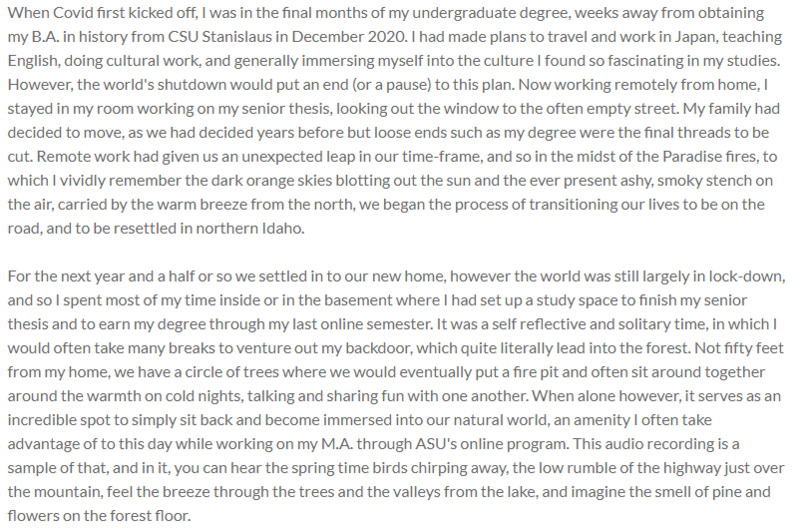 2022-05-26
2022-05-26Relocation in Isolation, Reconnection in Solitude
When Covid first kicked off, I was in the final months of my undergraduate degree, weeks away from obtaining my B.A. in history from CSU Stanislaus in December 2020. I had made plans to travel and work in Japan, teaching English, doing cultural work, and generally immersing myself into the culture I found so fascinating in my studies. However, the world's shutdown would put an end (or a pause) to this plan. Now working remotely from home, I stayed in my room working on my senior thesis, looking out the window to the often empty street. My family had decided to move, as we had decided years before but loose ends such as my degree were the final threads to be cut. Remote work had given us an unexpected leap in our time-frame, and so in the midst of the Paradise fires, to which I vividly remember the dark orange skies blotting out the sun and the ever present ashy, smoky stench on the air, carried by the warm breeze from the north, we began the process of transitioning our lives to be on the road, and to be resettled in northern Idaho. For the next year and a half or so we settled in to our new home, however the world was still largely in lock-down, and so I spent most of my time inside or in the basement where I had set up a study space to finish my senior thesis and to earn my degree through my last online semester. It was a self reflective and solitary time, in which I would often take many breaks to venture out my backdoor, which quite literally lead into the forest. Not fifty feet from my home, we have a circle of trees where we would eventually put a fire pit and often sit around together around the warmth on cold nights, talking and sharing fun with one another. When alone however, it serves as an incredible spot to simply sit back and become immersed into our natural world, an amenity I often take advantage of to this day while working on my M.A. through ASU's online program. This audio recording is a sample of that, and in it, you can hear the spring time birds chirping away, the low rumble of the highway just over the mountain, feel the breeze through the trees and the valleys from the lake, and imagine the smell of pine and flowers on the forest floor.
